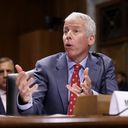Trump signs slew of sweeping energy executive orders
President Trump signed a blitz of first-day energy-related executive orders on Monday, establishing a national "energy emergency" and setting in motion actions that heavily favor expanding fossil fuel production and generation.
Why it matters: The moves amount to policy whiplash for the energy industry, segments of which had chafed under former President Biden's policies aimed at igniting the renewable sector.
Zoom in: The executive orders include a declaration of a "national energy emergency" aimed at increasing domestic energy production and lowering costs to the consumer.
- This is partly in response to the rapid AI-related growth of data centers and their energy needs, which the administration views through a national security lens.
- U.S. power demand is rising quickly after staying largely flat for the last 15 years.
- One of Trump's initial orders formally rescinds a series of Biden moves that stitched climate and environmental justice throughout federal agency decision-making, going well beyond energy and resource agencies.
This includes a repeal of the Biden administration's Justice 40 Initiative and a 2021 order that set aggressive federal procurement targets for EVs, clean power, low-carbon buildings and more.
- Trump also moved ahead with rolling back EPA tailpipe emissions rules that Republicans have characterized as an effective requirement for consumers to buy electric vehicles.
- The same order also seeks to restart liquified natural gas terminal approvals, which the Biden administration had paused for climate change and energy security grounds.
The intrigue: Other energy-related orders that Trump signed include steps to halt leasing of large wind farms, and boost oil and gas production.
- The administration also signed an executive order to boost Alaska's energy production, including by rescinding Biden's 2023 protection of major Alaskan coastal areas from drilling.
- He also signed an order that attempts to rescind Biden's formal withdrawal of East Coast, West Coast and major offshore Alaskan Arctic areas from drilling.
- But there's no guarantee producers have much appetite for exploring these regions, and formally selling drilling rights and enabling development would be a complicated bureaucratic and litigious process.
Other actions include seeking to pause funds from being spent under the Biden climate law, and shifting appliance energy efficiency standards back to Trump's first term, before Biden made them more stringent.
Threat level: Trump's attempted reversal of Biden-era policies could boost U.S. greenhouse gas emissions — or at least slow down projected reductions.
- This could worsen the severity and frequency of some extreme weather events as well as sea level rise, harming national security in other ways over time.
Reality check: Trump's "dominance" agenda will also confront market and process barriers — and plenty of litigation.
- U.S. oil output is already at record levels. Tepid global demand growth makes producers in Texas and elsewhere unlikely to flood the market.
- Gasoline and diesel costs are tethered to oil prices set on global markets, while electricity costs tend to be highly regional and dependent on weather and other forces.
- Executive orders can make some instant policy. Often they're a symbolic opening of the long, legally fraught bureaucratic slog of formally unwinding agency rules and policies.
Between the lines: Presidents can use emergency authorities to redirect resources and push the private sector to boost or maintain critical supplies.
- However, it's likely that the declaration itself will be challenged in court. And its provisions are likely to run into thorny legal issues given that state and regional authorities typically oversee power plant planning and permitting.
Between the lines: The oil and gas industry cheered Trump's opening moves.
- The good news for those companies extends beyond the energy orders.
- Trump's holding off for now on sweeping new tariffs that execs fear could raise project costs — and spur retaliation from buyers of U.S. exports.
- But it may be a temporary reprieve, with Trump instead ordering reviews of trade and currency imbalances.
What they're saying: "By fully harnessing our nation's abundant oil and natural gas resources, we can restore American energy dominance, drive economic prosperity and secure U.S. leadership on the global stage," Mike Sommers, president and CEO of the American Petroleum Institute, said in a statement.
- But Tiernan Sittenfeld of the League of Conservation Voters said in a separate statement: "It is crystal clear that his administration is all in to pad Big Oil Billionaire profits at the expense of our air, water, lands, climate, health, pocketbooks, and jobs."
The bottom line: The energy-related executive orders will yield some short-term actions on the ground.
- But it's their longer, topsy-turvy road to implementation that will be crucial to accomplishing the administration's goals.



